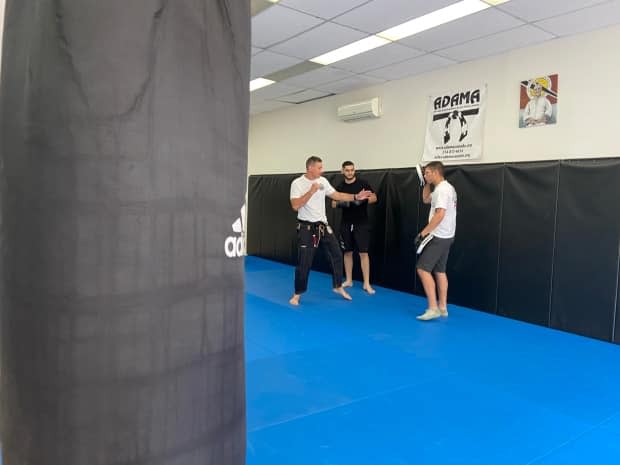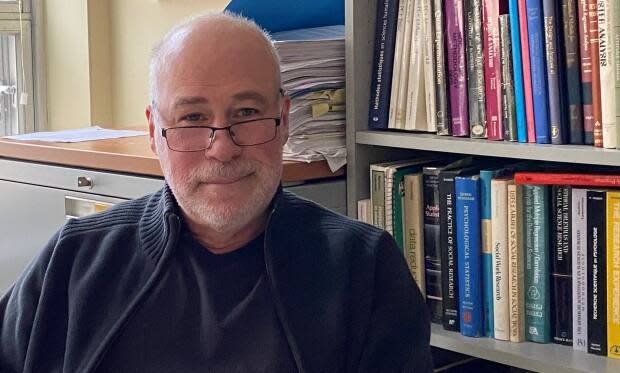Community groups working to end youth violence say Quebec's funding model creates barriers

Every weekday in Montreal's Mercier–Hochelaga–Maisonneuve borough, the sound of synthesized beats, live instruments and teens' voices can be heard resonating from a professional recording studio that offers free sessions to youth.
It's part of an initiative called Projet Haut-Parleur, created by community group Projet Harmonie, to offer alternatives to criminality for at-risk teens in the neighbourhood.
"Having them create art is very good for their self-esteem, for their sense of belonging and all of that has an effect on how they develop as adults," said Rémi Ste-Marie, an intervention worker with the community group and co-ordinator of the project.
But Ste-Marie says that takes time, and he isn't sure the kids will have enough of it due to the manner in which the province allocates funds to community groups.
WATCH | Finding creative outlets for at-risk youth:
Projet Haut-Parleur is funded for three years by Quebec's Public Security Ministry. But group leaders like Ste-Marie say giving young people the tools to succeed is made harder when organizations need to reapply to fund projects like these every few months or years.
"Three years is not going to [make] a major difference in the long term," Ste-Marie said. "We could do this for 50 years and we would feel the need to do it 50 years after that."
Nicolas Lachance-Barbeau, who works with Rue Action Prévention Jeunesse (RAP Jeunesse) is in the same boat. He runs a violence prevention program through martial arts and combat sports in the Saint-Laurent borough, which he says provides an outlet and teaches discipline and respect to at-risk youth between the ages of 12 and 25.
"It's a way to learn how to master violence and to master your behaviour in an environment of violence. So it is not violence as a means to get something — it is how to master your inner violence," Barbeau said.

He said the kids that come to learn Brazilian jiu-jitsu, mixed martial arts and muay thai at the academy are often those that would otherwise look for a thrill in alternative, sometimes criminal, ways.
Despite the benefit of the program, the co-ordinator fears he won't be able to keep it going after his funding from Quebec's Public Security Ministry runs out in two years. And he says reapplying for financial aid takes the work of a full-time employee.
"It's a lot of work, administratively speaking, and this energy could be put on developing a program and making sure that what you already have is a lot more structured," he said.
"We need to be able to apply for long-term projects because prevention is a long-term project."
'15, 20 years of work'
Last December, Quebec announced $52 million in funding for prevention initiatives geared toward the province's youth until 2026. The funding came in response to a long-standing request from community organizations during a year where four teenagers were killed in violent crimes, including shootings.
This year, according to Quebec's Public Security Ministry, $750,000 of that funding has been allocated to sports, arts and culture initiatives, $1 million to intervention initiatives to reduce things like youth homelessness and prostitution and $2 million to the consolidation and creation of spaces for Montreal youth over the next two years.

But Marc Alain, a professor at the Université du Québec à Trois-Rivières and researcher on intervention methods with young offenders, says it will take longer-term investments to reduce criminality.
"It's not a four-year government mandate we are talking about. We are talking about 15, 20 years of work," he said.
Alain said he'd like to hear the government tell community workers: "You know your social reality, we trust you, do the best, and here you go. You have five, six, seven years in order to put things in motion for a long-term strategy and [we] will support you."
Earlier this month, the federal government promised nearly $42 million to tackle gun violence in Quebec. It came after three people had been fatally shot that week, in what seemed to be random attacks.
It is now up to the province to decide how to split the money between police services, community organizations and municipalities.

 Yahoo Movies
Yahoo Movies 
